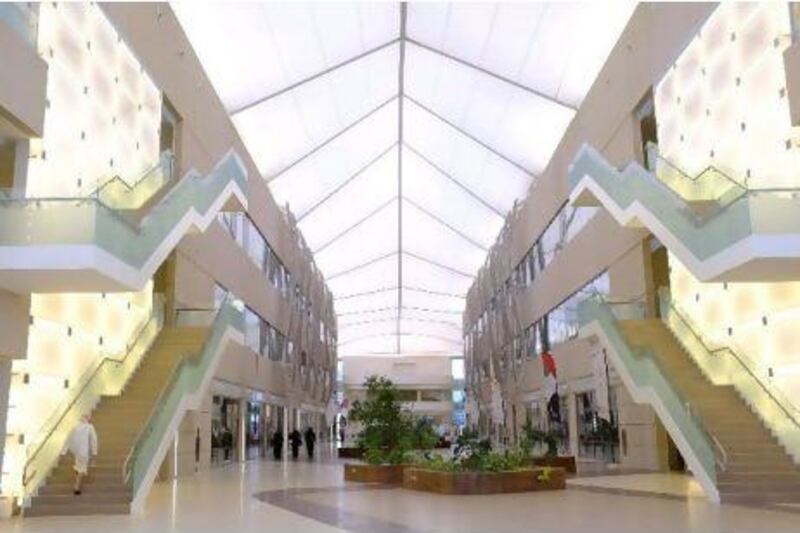ABU DHABI // Zayed University will rent out parts of its new Dh3.7 billion campus to try to balance the books on the sprawling site.
Construction of the campus was funded by Mubadala, a strategic investment company owned by the Abu Dhabi Government, but there is no separate budget for maintenance of the property.
That leaves the university scrambling to make up a shortfall, or putting some facilities - including a convention centre with a 1,000-seat theatre - in mothballs, or cutting back on teaching and research.
The provost, Dr Larry Wilson, admits Zayed University will have to hold two significant events a month to be able to stay afloat.
"We'll be looking for local support to help us in terms of funding, since the budget is only based on students enrolled," Dr Wilson said. "The rest is up to us."
None of the university's classes come close to its 1,000 capacity, so its academic uses are limited.
That leaves it empty except for popular guest speakers such as Hillary Clinton, who spoke last year at the old campus in the city.
While there is no expectation that the convention centre will make money, Dr Wilson fears breaking even will be a challenge.
"It won't be easy finding events for that size venue," he added.
Organisations such as the country's orchestra have expressed interest in the full-size, hydraulic stage complete with wings and orchestra pit.
"We just need the expertise to run it," said Dr Wilson. "It's so high-tech that we really need people with the right knowledge.
"We'll need technicians, a director, someone to market the facilities - all this is extra hiring for us."
The same will apply to the new sports centre.
Dr Wilson hopes that as a federal institution the university will be able to offer competitive rates for using the premises, which will generate interest.
Meanwhile, Dr Tom Cochran, the director of Zayed University's Abu Dhabi campus, is dealing with the day-to-day details of juggling an already stretched budget.
Even the basic running costs such as cleaning and lighting such a large campus, which has a capacity of 6,000, are not trivial, he said.
"It costs a lot to cool a building like this," Dr Cochran said.
"It's factored into our budget but with this campus, we don't have any history to go by in terms of maintenance costs."
While the university has projections, "the reality is something we are still going through", he said.
For this academic year all three of the country's federal institutions, which also include UAE University and the Higher Colleges of Technology, have faced huge funding shortfalls.
Zayed University had its budget cut by Dh32 million, amounting to 8 per cent less than the required amount calculated by the Ministry of Higher Education and Scientific Research.
At the university's opening ceremony in September, its vice president, Dr Sulaiman Al Jassim, told staff that sparring with the Ministry of Finance over the budget was inevitable.
Dr Cochran said funds had been set aside to get Zayed University's facilities off the ground.
"In time we hope to shift that cost to the revenue we bring in from the convention centre, but first we will have to fund it out of our resources," he said.
Other UAE universities rarely rent out their facilities.
Dr Ammar Kakar, the campus head of the UK institution Heriot-Watt in Dubai, which has built its own facility at Dubai International Academic City (Diac), said that while the home campus in Scotland hired out its conference centre, the Dubai branch did not have the facilities to offer.
Dr Kakar said that in Scotland, "it's a way to cover costs. Any profit is reinvested in the university".
Even if they did have the facilities, most universities would not be allowed to rent them out under rules set by Tecom, which manages the education clusters Knowledge Village and Diac. It bans institutions from sub-letting facilities.
Only those with their own campuses, Manipal University and Heriot-Watt, are allowed to.
The 11,000-capacity campus at the University of Sharjah, the country's largest private university, has an Olympic-sized swimming pool and track and field facilities.
When it does rent them out, "this is by no means a profit", said its chancellor, Prof Samy Mahmoud.
"If we are asked for our facilities, for example, by a government department, we simply calculate how much we need to charge for the cleaning, security and equipment. It is only done on rare occasions."






